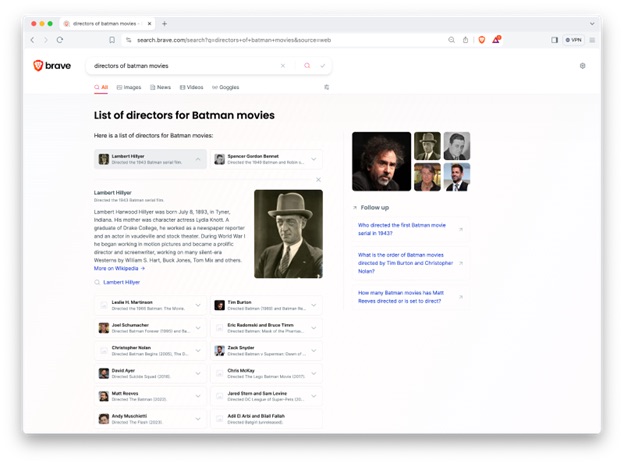Privacy-focused search engine Brave announced Wednesday that it is revamping its answer engine to return synthesized answers powered by artificial intelligence. The new feature is available to users around the world.
The new “Reply with AI” feature returns carefully formatted answers for questions like “People who walked on the moon,” “List of all the actors who played Batman,” or “How to descale the Nespresso gremlin.” You can also summarize reviews and highlights of a restaurant, for example.

Image credits: Brave
The company launched an AI-powered summary feature in March 2023. The startup said its new AI-powered search is a big improvement on that.
Brave said that informational queries, like the one that appears on the new answer engine, will automatically rely on AI to present the information in a summarized format. For other queries, users can trigger an AI search manually.
Image credits: Brave
The company, which switched to using its own index for search queries last year, said its “Reply with AI” feature uses a combination of large language models (LLM) and trusted data. Brave said it uses a combination of Mixtral 8x7B and Mistral 7B as core models along with custom transformer models for matching and semantic response.
“The user only needs to enter a query as they are used to doing in a normal search engine. The query will then be converted internally into an LLM message using the search results data as context for the message, with the typical RAG (retrieval augmented generation),” the company’s head of search, Josep Pujol, told TechCrunch. , by email.
Image credits: Brave
Multiple reports have noted that AI-powered search could have serious effects on the future of the web. Brave, which handles more than 10 billion queries a year, said that while users are demanding AI-enhanced responses and new methods of content consumption, the company is aware that this approach could be detrimental to publishers publishing content. in the web.
“This challenge is not unique to Brave Search, but is present in most AI-powered, premium or open answer engines and chatbots. Brave, as a browser and search engine, is aware of these challenges. “Accordingly, we will monitor and quantify the impact of AI-generated content on site visits and eventually address any disruptions that the drop in traffic could cause,” the company said.
Other search engines, such as Google and Bing, have also adopted AI-based responses through different experiments. Meanwhile, startups like Perplexity and You.com are also vying to be the answer engine of choice for users.